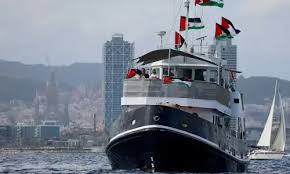More migrants to be taken to Albania under Italy deal despite sentences

Rome: Another group of migrants boarded the Italian Navy ship Libra on November 4 to be transferred to Albania, even though judges are continuing not to validate the practice.
Navy ship Libra on November 4 took on another group of migrants to be taken to Albania, where Italy has opened new processing centers. Well-informed sources said the group includes six to eight people.
In Italy, however, judges are continuing not to validate the detention of migrants in such centers, in spite of a decree approved by the government on October 21, three days after a Rome court nixed the detention of the first group of migrants taken to Albania, defining a list of safe countries for repatriation.
On Monday, November 4, a court in Catania also did not validate the detention of three Egyptians and two citizens of Bangladesh.

Deputy Premier and Transport Minister Matteo Salvini, leader of the League party, slammed the decision saying that “due to some Communist judges who don’t implement laws, Italy is now the unsafe country. But we are not giving up!”
The decree approved by the government following the Rome court’s decision to nix the detention of the first 12 migrants transferred to Albania has not resolved the issue.
The objective was to resolve the fact that an October 4 sentence of the European Court of Justice based on which the Rome judges had not validated the migrants’ detention. The ruling established stricter criteria for determining what constitutes a safe country.
On Tuesday, October 29, a court in Bologna referred to the European court a case concerning a citizen of Bangladesh who has requested international protection, asking whether EU legislation should prevail in case of conflict with Italian law.
On November 4, judges in Catania inflicted another blow to the government measure. A list of ‘safe countries’, the sentence said, “does not exempt the judge from the obligation to verify” whether it is compatible “with European Union law” and “in Egypt, there are grave violations of human rights” that “affect the freedoms of a democratic system”.
Egypt is among the 19 countries defined as safe by the decree.
The judge went on to write that it is “one of the countries where the death penalty is applied and in which the number of executions is among the highest in the world”, with “cases of arbitrary detentions also reported recently and arrests without a warrant carried out by police forces,” noting that pre-trial detention is a “common practice” and “forced disappearances are not infrequent.”
A similar evaluation was made for Bangladesh, also listed as safe by the decree, when the detention of two asylum seekers was not validated.
A similar decision to the one taken in Bologna was also taken by Rome’s tribunal which suspended the effectiveness of the rejection of an asylum application for one of the 12 migrants taken to Albania. The new decree was referred to the European Court of Justice with an urgent response requested.
Members of the ruling coalition have protested. In addition to Salvini, members of Premier Giorgia Meloni’s Brothers of Italy (FdI) party have intervened. “The presumption of some judges of replacing Parliament is misplaced because it constitutes a dangerous interference in the legislative process,” said FdI’s Lower House whip, Tommaso Foti.
The deputy speaker of the Lower House, Fabio Rampelli, said “some magistrates want to dictate the agenda of migration policies, replacing the government, which is unacceptable.”
The opposition replied asking the “government to stop this dangerous game for institutions” avoiding “further useless waste and interrupting new transfers,” said Matteo Mauri of the center-left opposition Democratic Party (PD).
Meanwhile, the sentences have not halted the Albania plan. After the flop of its first journey, the Libra vessel rescued on November 4 a new group of asylum seekers who, after being screened on board, will be transferred to Shengjin for accelerated border procedures; they will then be taken to the Gjader center.
Then the special immigration unit of Rome’s tribunal will decide whether to validate their detention which, given the precedents, is uncertain.
Meanwhile, the interior ministry has appealed against the first failed validations to the Supreme Cassation Court. New sentences issued by courts of first instances, taken by the courts after the decree was approved on October 21, can be opposed to an appeals court.
And Interior Minister Matteo Piantedosi has said he is “confident” and the “Albania project will continue”. “In 2026, a European regulation coming into effect will bind border countries like Italy,” he said.
“What we have done is a necessary investment to prepare in advance for the implementation of European legislation and all of Europe is watching this implementation with a lot of interest”, he added.





